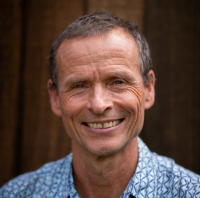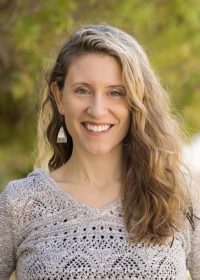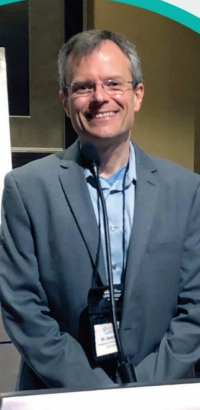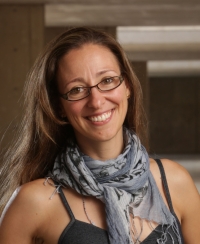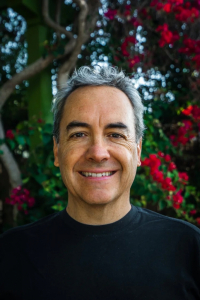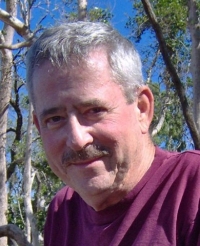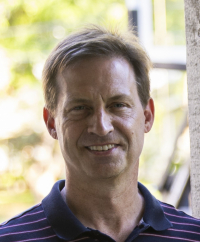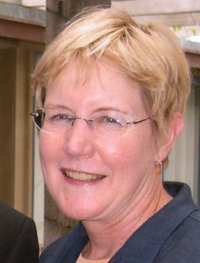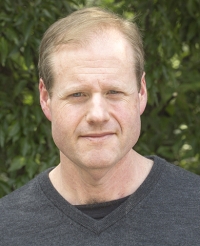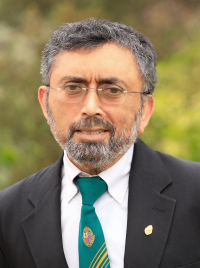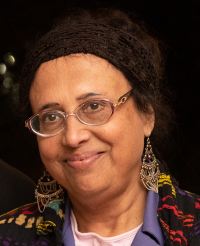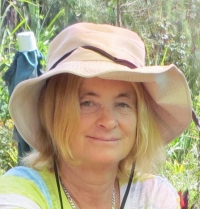Comparative Anthropogeny: From Molecules to Societies
Biographical Sketches: Co-Chairs
UC San Diego
Pascal Gagneux is CARTA's Executive Co-Director, a Professor of Pathology and Anthropology, and the Department Chair of Anthropology at UC San Diego. He is interested in the evolutionary mechanisms responsible for generating and maintaining primate molecular diversity. The Gagneux laboratory studies cell-surface molecules in closely related primates species. His focus is on glycans, the oligosaccharides attached to glycolipids and glycoproteins of the surfaces of every cell and also secreted into the extra-cellular matrix. Gagneux's laboratory is exploring the roles of molecular diversity in protecting populations from pathogens as well as potential consequences for reproductive compatibility. Dr. Gagneux’s interest is in how glycan evolution is shaped by constraints from endogenous biochemistry and exogenous, pathogen-mediated natural selection, but could also have consequences for sexual selection. Dr. Gagneux has studied the behavioral ecology of wild chimpanzees in the Taï Forest, Ivory Coast, population genetics of West African chimpanzees, and differences in sialic acid biology between humans and great apes with special consideration of their differing pathogen regimes. In 2011, while Associate Director of CARTA, Dr. Gagneux helped to establish a graduate specialization in Anthropogeny at UC San Diego. This wholly unique graduate specialization is offered through eight participating graduate programs in the social and natural sciences at UC San Diego.
University of Nevada, Las Vegas
Alyssa Crittenden is a human behavioral ecologist and nutritional anthropologist who has worked with the Hadza hunter-gatherers of Tanzania since 2004. Her primary research interest is the study of the evolution of human behaviors as a function of socioecological context. The majority of her work explores the intersection of diet, life history, and sociality during human evolution. Her research foci include: evolution of the human diet; evolution of childhood; children’s foraging and food sharing; nutritional and behavioral correlates of cooperative breeding; life history theory. She is currently Vice Provost for Graduate Education; Dean of the Graduate College; and Professor of Anthropology at University of Nevada, Las Vegas and serves on the CARTA External Advisory Board.
Biographical Sketches: Speakers
University of Southern California, Keck School of Medicine
Joseph G. Hacia is a Professor of Biochemistry and Molecular Medicine at the Keck School of Medicine of the University of Southern California. His laboratory focuses on translational research relevant to peroxisomes, membrane-bound metabolic organelles involved in numerous cell signaling pathways. This research includes investigating gene therapy, gene editing, and small molecule therapies for peroxisomal disorders including Zellweger spectrum disorder, adult Refsum disease, and X-linked adrenoleuokodystrophy. In addition, they are interested in identifying human adaptions to diet, such as the increased exposure to animal fats. They have uncovered human-specific differences in the metabolism of phytanic acid, a branched chain fatty acid present in ruminant fats, dairy products, and certain fish, relative to the great apes, which could affect the function of multiple organ systems and transcriptomes of these species. Similar human-specific differences were observed when investigating the levels of red blood cell plasmalogens, membrane ether phospholipids critical for numerous physiological processes ranging from cognition to reproduction to aging.
Dr. Hacia was a Howard Hughes Medical Institute Predoctoral Fellow, a recipient of the American Society of Human Genetics Postdoctoral Translational Research Award, and a V Foundation for Cancer Research Scholar. He has served on the editorial boards of Genome Research, Nucleic Acids Research, BMC Genomics, and BMC Medical Genomics and served on many NIH grant review panels. Furthermore, he is a member of scientific advisory boards for rare disease foundations including the Global Foundation for Peroxisomal Disorders, RhizoKids International, the United Leukodystrophy Foundation, Global DARE Foundation, Hannah's Hope Fund, COMBINEDBrain, and the Yaya Foundation. Currently, he is the corresponding Principle Investigator for the NIH-funded research resource "Mouse Models for Peroxisome Research".
Dr. Hacia is active in graduate teaching and has been a Chair of Medical Education at the USC Keck School of Medicine. He has been awarded the Kaiser-Permanente Excellence in Teaching Award for the Basic Science Years of Medical School multiple times and was elected a member of the Alpha Omega Alpha (AOA) Medical Honor Society by vote of the Class of 2022, Keck School of Medicine.
University of California San Diego
Maria Carolina (Carol) Marchetto is an Assistant Professor at the Anthropology Department, UC San Diego, and serves on the CARTA Internal Advisory Board. Dr. Marchetto earned a BSc in Biological Sciences in 1998 and a Ph.D. in Microbiology in 2005 from the University of Sao Paulo, Brazil. Dr. Marchetto moved to San Diego in 2005 for her postdoctoral research in stem cells and neuroscience in the lab of Dr. Fred Gage at the Salk Institute. Prior to her appointment at UC San Diego, Dr. Marchetto was a Staff Scientist at the Laboratory of Genetics at The Salk Institute where she led projects that studied neuronal development using human and nonhuman primate stem cells. Her current work focuses on using patient-derived induced pluripotent stem cells to study the cellular behavior of human neurons in neuropsychiatric and neurodevelopmental conditions such as Autism and Bipolar Disorder. Dr. Marchetto’s work is also focused on human evolution in the context of human brain expansion and neuronal development. Her innovative approach uses stem cell models from human and nonhuman primate species to test hypotheses about the role of disruptions to human-specific cellular and molecular signatures in development and their potential impact on mental health. She is a BRAINS Program Fellow, and her work has received funding from the National Institutes of Mental Health and the Larry L. Hillblom Foundation.
University of California, San Diego
Rafael Núñez, professor of cognitive sciences at UC San Diego for over 20 years is now at ETH Zürich in Switzerland. Born and raised in Chile, he completed his doctoral career in Switzerland, and conducted his post-doctoral work at Stanford and UC Berkeley. He investigates the development and evolution of everyday and technical cognition (such as mathematics)—especially conceptual systems, symbolization, and abstraction— and their biologically enculturated underpinnings. His multidisciplinary approach uses methods such as psycholinguistic experiments, co-speech gesture, brain imaging, and field research with isolated indigenous groups in the Andes, Papua New Guinea, and the Amazon basin. His 2001 best-selling book, Where Mathematics Comes From: How the Embodied Mind Brings Mathematics into Being (co-authored with UC Berkeley linguist George Lakoff), presents a new theoretical framework for understanding the human bio-cultural nature of mathematics and its foundations. Rafael Núñez is on the Scientific Advisory Board of the Australian Centre of Excellence for the Dynamics of Language, a Senior Advisor of the Swiss National Centre of Competence in Research "Evolving Language", and a fellow of the Wissenschaftskolleg zu Berlin. He is one the four PIs of the recently awarded European Research Council Synergy Grant QUANTA, designed to investigate the bio-cultural evolution of quantification and numeral systems around the world. He has been recently elected life-time fellow of the Cognitive Science Society for his “impact on the Cognitive Science community, and [his] sustained record of excellence in research contributions." He is the only South American to have ever received this distinction.
University of Utah
James F. O'Connell is Distinguished Professor Emeritus of Anthropology at the University of Utah. He is a member of the National Academy of Sciences, USA, an Honorary Fellow of the Australian Academy of Humanities, and a Fellow of the American Association for the Advancement of Science. He is on the editorial boards of the Proceedings of the National Academy of Sciences and the journal Australian Archaeology. O'Connell earned his undergraduate and postgraduate degrees at UC Berkeley (PhD 1971). Working with Robert Heizer and Robert Rodden, his PhD dissertation examined the prehistoric archaeology of the western Great Basin. After graduation, he took a post at UC Riverside for three years before accepting a Research Fellowship at the Australian National University (ANU). There he undertook ethnoarchaeological work with Alyawarra and Anmatjere speakers (dialects of Arrernte) near Bundey River Station in the Northern Territory of Australia. Though originally planned as a study of site structure, O'Connell had been influenced by Robert MacArthur's Geographical Ecology, which led him to undertake quantitative observations of subsistence behavior in addition to studies of material remains. After several years at ANU, O'Connell accepted a position at the University of Utah in 1978 where he continued ethnoarchaeological and archaeological research in Western North America and Australia. He also started additional projects in Africa, most notably his research with Hadza hunter-gatherers in Tanzania. Collaborating with Kristen Hawkes (Utah) and Nicholas Blurton Jones (UCLA), their research sought to explain the evolution of human life histories, Plio/Pleistocene hominin hunting strategies and the emergence of the genus Homo from an evolutionary ecological perspective. To date, O’Connell has published over 150 books, journal articles and book chapters, including seminal work applying evolutionary ecology to human behavior, novel ethno-archaeological work linking behavioral ecological explanations of human behavior to its material consequences and applying these insights to prehistory. Applications of the latter include recent work with Jim Allen (LaTrobe University, Melbourne) directed toward understanding the Pleistocene colonization of Sahul (Pleistocene Australia/New Guinea).
Emory University
James K. Rilling is a Professor of Psychology at Emory University, with a secondary appointment in the Department of Psychiatry and Behavioral Sciences. Dr. Rilling uses brain imaging, genetics and endocrine assays to investigate the biological bases of human social cognition and behavior, with a current focus on caregiving in fathers, grandmothers and dementia caregivers. Much of his research is examining the role of oxytocin signaling in human social cognition and behavior. His latest book is Father Nature: The Science of Paternal Potential (The MIT Press, 2024)
UC San Diego
Margaret Schoeninger is Distinguished Professor Emerita of Anthropology at UC San Diego, a Research Archaeologist in the Glenn Black Laboratory of Archaeology at Indiana University, and Emerita Co-Director of CARTA. She has done fieldwork in North America, Mexico, Pakistan, India, Kenya, and Tanzania as well as laboratory research on carbon, nitrogen, and oxygen stable isotope ratio analysis in biological tissues and food component analysis of traditional foods. Her major interest is in the evolution of human diet particularly as it informs our understanding of the appearance and evolution of the human lineage.
Emory University
Dietrich Stout is an Associate Professor of Anthropology at Emory University, where his Paleolithic Technology Laboratory investigates the role of technology in human evolution. Dr. Stout is also Associate Director of Emory’s cross-disciplinary Center for Mind, Brain, and Culture, which promotes diverse and integrative research into human nature and experience. He received his Ph.D. in Paleoanthropology in 2003 from Indiana University, Bloomington, where he studied with Professors Kathy Schick and Nicholas Toth. He then spent one year as a Visiting Assistant Professor in Anthropology at George Washington University and four years as a Lecturer (equivalent U.S. Asst. Prof.) in Paleolithic Archaeology at the University College London Institute of Archaeology before relocating to Emory in 2009. His research focus on Paleolithic stone tool-making and brain evolution integrates field research at Plio-Pleistocene archaeological sites in Ethiopia with laboratory and museum research including artifact analysis and experimental replication, functional and structural neuroimaging, behavioral analysis, and psychometric testing. His work is published in discipline-specific journals ranging from Current Anthropology and the Journal of Archaeological Science to Neuroimage and the Journal of Neuroscience, as well as multidisciplinary venues such as the Proceedings of the National Academy of Sciences, and Science.
UC San Diego School of Medicine
Ajit Varki is a Distinguished Professor of Medicine and Cellular & Molecular Medicine, Emeritus Co-Director of CARTA, Emeritus Co-Director of the Glycobiology Research and Training Center at UC San Diego, and Adjunct Professor at the Salk Institute. He received basic training in physiology, medicine, biology, and biochemistry at the Christian Medical College (CMC), Vellore, The University of Nebraska, and Washington University in St. Louis. He also has formal training and board certification in internal medicine, hematology, and oncology. Varki is the executive editor of Essentials of Glycobiology (Cold Spring Harbor Press, 4th Edition, 2022) and is recipient of a MERIT award from the NIH, and an American Cancer Society Faculty Research Award. Honorific elections include the American Academy of Arts and Sciences, the National Academy of Medicine, the American Society for Clinical Investigation, and the Association of American Physicians. He is also recipient of the three highest honors in his field, the Karl Meyer Award of the Society for Glycobiology, the International Glycoconjugate Organization Award and the Rosalind Kornfeld Award for Lifetime Achievement in Glycobiology. He is recognized for creating the first major open access research journal (J. Clin. Invest., 1996) as well as the first major open access textbook (Essentials of Glycobiology, 2009). He was honored with the Old Cottonian of Eminence Award at the 150th Anniversary of Bishop Cotton Boys School, Bangalore, India, (2015) as well as a Distinguished Faculty Medal and Oration at his medical school alma mater, CMC, Vellore. Significant past appointments include: Co-Head, UC San Diego Division of Hematology-Oncology; President of the Society for Glycobiology; Editor-in-Chief of the Journal of Clinical Investigation; Interim Director of the UC San Diego Cancer Center, President of the American Society for Clinical Investigation, and UC San Diego Associate Dean for Physician-Scientist Training. Varki's research interests are focused on a family of cell surface sugars called sialic acids, and their roles in biology, evolution and disease. Currently, active projects are relevant to the roles of sialic acids in microbial infectivity, the regulation of the immune response, the progression and spread of tumors, aging, and unique aspects of human evolution. His group is particularly intrigued to find multiple interrelated differences in sialic acid biology between humans and our closest evolutionary cousins, the "great apes." These differences are a signature of the events that occurred during the last few million years of human evolution, and appear to be relevant to understanding several aspects of the current human condition, both in health and disease. Varki’s book, Denial (Twelve, Hachette Books, 2013), explores a novel "Mind Over Reality Transition” (MORT) theory that denying reality and personal mortality was a key step in allowing the emergence of a full theory of mind, and in the origin of our species.
UC San Diego School of Medicine
Nissi Varki is Professor of Pathology at UC San Diego. She obtained her primary medical degree at Christian Medical College, Vellore, India, one of the foremost medical institutions in South-East Asia, and became US Board Certified in Anatomic and Clinical Pathology, following pathology residencies at Creighton University, Omaha, Nebraska, and St. Louis, Missouri. She went on to acquire postdoctoral training in tumor immunology, first at Washington University in St. Louis, and then at the Research Institute of Scripps Clinic in San Diego. After a short stint on the faculty in the Department of Pathology at UCLA, she moved to UCSD in 1985. After of period of NIH-funded basic research on the mechanisms of cancer metastasis, she started up four histopathology core laboratories at UCSD, helping investigators analyze normal and diseased tissues, particularly those from genetically altered mice. Dr. Varki serves on the School of Medicine Recruitment and Admissions Executive Committee and teaches sophomore medical students. She also teaches immunohistochemistry and histopathology to medical and graduate postdoctoral fellows, and helps students attain histotechnology certification. She also teaches an elective course for graduate and medical students entitled "Practical Histopathology in Mouse Models of Human Disease." In recent years, she has focused her expertise in immunohistology and pathology towards comparisons of humans and great apes, our closest evolutionary cousins, discovering several differences that of are of known or potential biomedical importance.
Arizona State University & University of Utah
Polly Wiessner is a Professor of Anthropology at Arizona State University and the University of Utah. Over the past forty years, she has conducted ongoing research among the !Kung (Ju/'hoansi) Bushmen of the Kalahari Desert on social networks, demography, economy and firelit stories. For the past thirty-four years, she has carried out ethnohistorical studies of oral traditions among the Enga of highland Papua New Guinea (PNG), tracing developments in warfare, ritual, conflict resolution and exchange over the past 400 years. She is currently studying the breakdown of traditional cultural institutions with the introduction of new technology, modern myths and how the Enga are applying restorative justice based to rebuild communities and maintain harmony through restorative justice.
